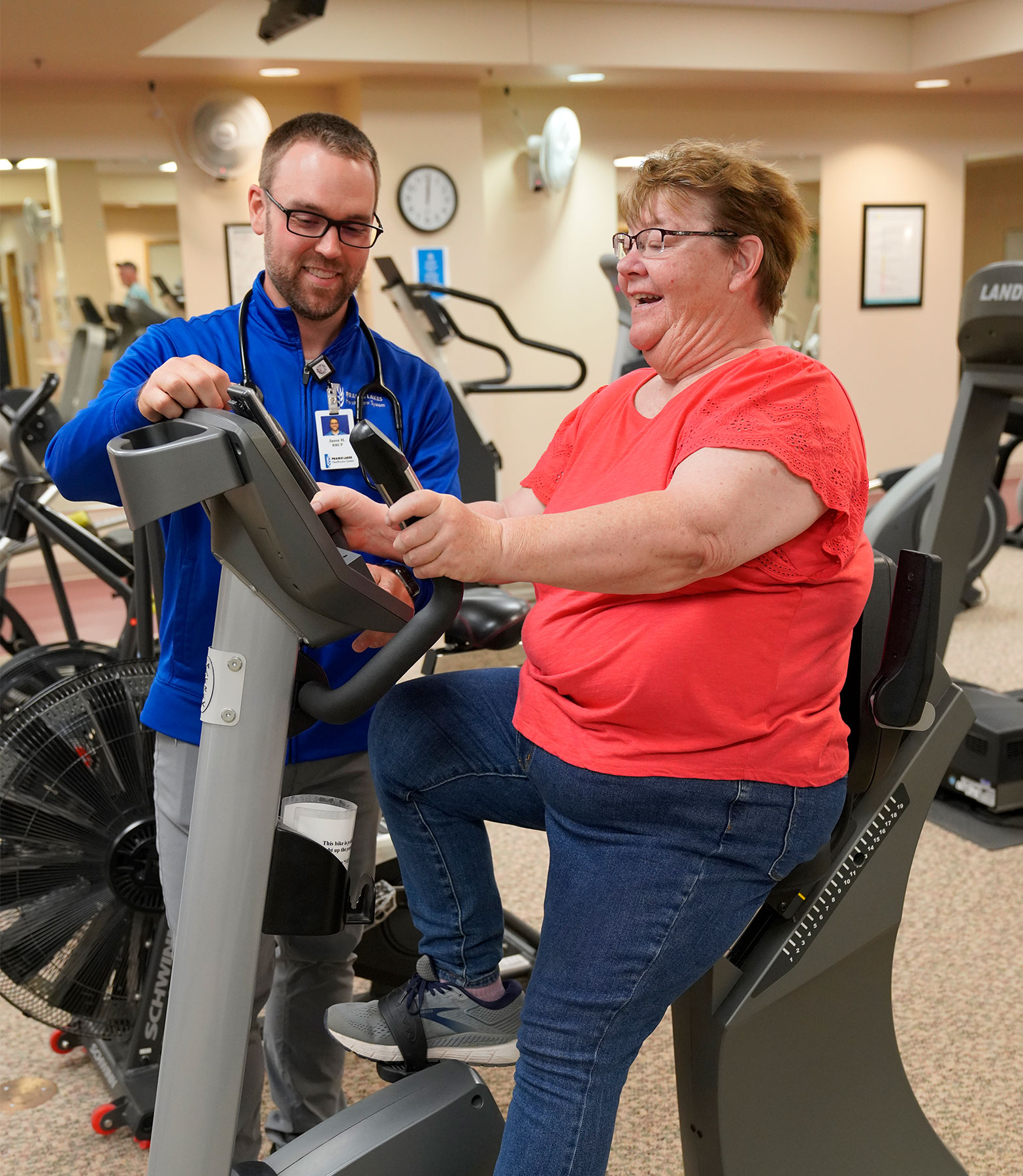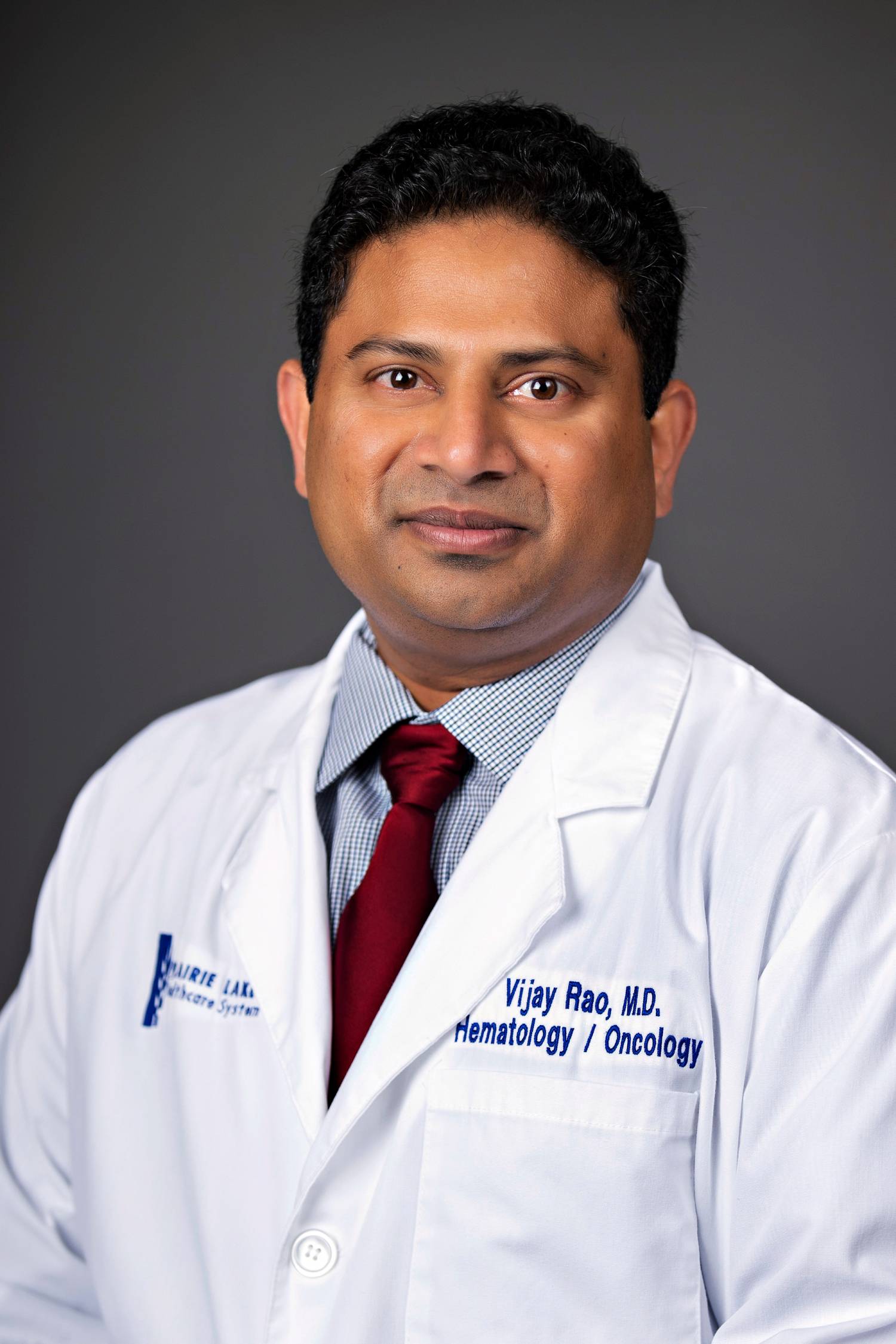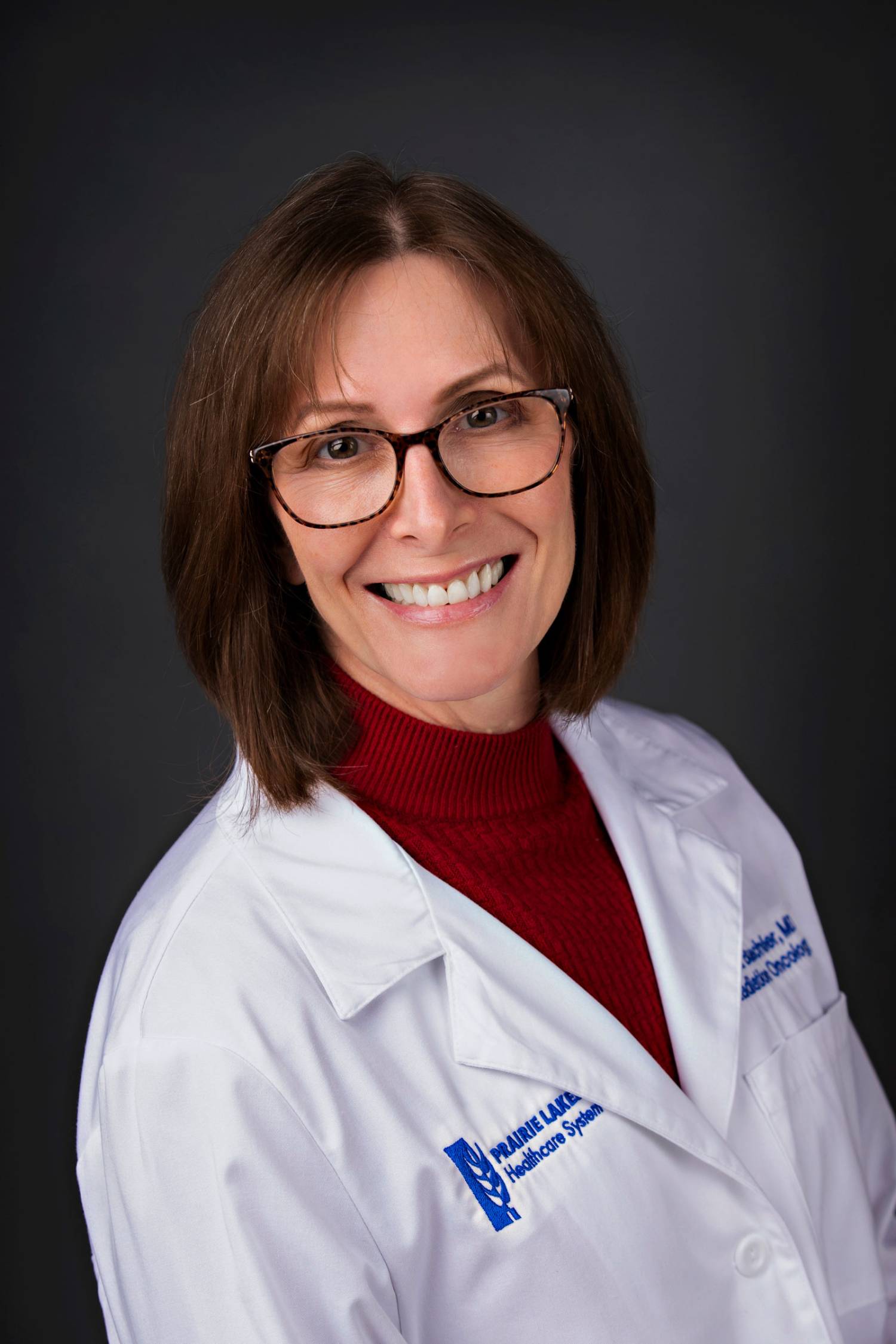Cancer patients receive advanced oncology treatments in the comfort of beautiful surroundings and a tranquil atmosphere at the Prairie Lakes Cancer Center. Located in Watertown, local patients have the convenience of receiving treatment closer to home and more time with family and friends.
Prairie Lakes Cancer Center is committed to providing patients with innovative treatments and caring support. We come together for courageous fighters who inspire us daily. Our approach to healing is holistic and interdisciplinary. The cancer team includes:
- Medical Oncologist/Hematologists Dr. Amin and Dr. Rao (chemotherapy and infusion treatment physicians)
- Radiation Oncologist, Dr. Buechler
- Nurse Practitioner, Kristina Rieffenberger
- Oncology certified nurses
- Radiation dosimetrist and therapists
- Pharmacists
- Laboratory technicians
- Registered dietitians
- Oncology social workers
Services available to patients include support services. Social workers provide ongoing emotional support and assists patients in finding financial resources and making referrals to community programs. Technology at the Prairie Lakes Cancer Center includes advanced radiation therapy, chemotherapy, mobile PET scanning, and clinical trials.
The Tumor Registry is an integral part of the cancer program. Prairie Lakes is one of six hospitals in South Dakota with an active tumor registry. The tumor registrar tracks patient data that is recorded into a national database and used for research and studies.
Published in
Cancer Treatment
The Prairie Lakes Cancer Center staff utilizes an advanced radiation therapy treatment system called TomoTherapy. The TomoTherapy platform introduces a new, integrated way to deliver radiation treatments for cancer. Unlike traditional radiation therapy equipment, TomoTherapy is a first-of-its-kind system that features an advanced CT scanner and the ability for 360-degree radiation delivery, all in one unit. By combining the scanning and delivery, the process is simplified for the patient.
TomoTherapy lets clinicians efficiently acquire 3D images of every patient. With these images, clinicians can check the size, shape, and location of tumors before each treatment. Then, they can compare that day’s image with the one used for planning, to make sure that radiation will be directed to where it should be. These CT images can also be used to analyze and, if necessary, modify a patient’s treatment at any point during the treatment course.
With TomoTherapy, Patients Can:
- Receive radiation while avoiding critical organs
- Experience fewer side effects
- Achieve a higher quality of life
Published in
Cancer Treatment
The Cancer Center utilizes mobile PET scanning services. PET images contain information about tissue function or metabolism. Physicians utilize PET scans for diagnosing, staging, and evaluating treatments for cancer patients.
What is Positron Emission Tomography (PET)?
Your physician has ordered a Positron Emission Tomography (PET) scan. PET images can provide important information about many conditions affecting the heart, brain, and other organs, which will help doctors plan an appropriate treatment for you.
PET images are different than those from more conventional imaging equipment, such as X-ray, CT, ultrasound, or MRI. PET images contain information about tissue function.
The Cancer Center utilizes mobile PET scanning services. Physicians utilize PET scans for diagnosing, staging, and evaluating treatments for cancer patients.
How much time should I allow?
Patients should expect to be in the PET unit for one and a half to three hours. The actual scan itself takes less time.
Can I eat or drink before the scan?
This depends on the type of study, but typically the patient will be asked not to eat anything after midnight the night before the scan. Usual preparation involves fasting for six hours prior to the scan. It is good to drink water, but avoid all beverages with caffeine and sugar.
Preparation
- For your comfort and peace of mind of the patient, be sure to:
- Tell the physician if the you are pregnant or thinks you might be, or if you are a nursing mother.
- Wear comfortable clothing.
- Do not wear clothing with metal, like jeans.
- Tell the doctor if you are diabetic.
- Leave valuables at home, but you may wear hearing aids, glasses and dentures.
- Take any prescribed medicines on the day of the scan unless instructed not to do so.
- Ask the doctor about eating after midnight on the day prior to the scan.
- Avoid all beverages with caffeine and sugar.
The Procedure
To begin the procedure, a small amount of radioactive glucose injected into the bloodstream. There is no danger from this injection. Glucose (also known as sugar) is a common substance every cell in the body needs in order to function. Radioactive glucose must pass multiple quality control measures before it is used for any patient injection. The radiation exposure associated with PET is similar to that associated with a conventional CT scan.
After the injection, patients wait approximately one hour while the injected material is distributed throughout the body. Then, the patient will be asked to lie on a table that passes slowly through the scanner. The scanner resembles a CT scanner, but has a much larger opening. Some people fall asleep during the scan.
How will I feel afterward?
There are no side effects from the injected tracer. If you have a heart scan, you may feel flushed.
How do I see my results?
The studies are read by a radiologist after the PET scan is completed. You will receive the results from your physician at your follow-up appointment.
Published in
Cancer Treatment
Cancer is the general name for a group of more than 100 diseases. Although there are many kinds of cancer, all cancers start because abnormal cells grow out of control. Untreated cancers can cause serious illness and death. The body is made up of trillions of living cells. Normal body cells grow, divide, and die in an orderly fashion. During the early years of a person's life, normal cells divide faster to allow the person to grow. After the person becomes an adult, most cells divide only to replace worn-out or dying cells or to repair injuries.
How cancer starts
Cancer starts when cells in a part of the body start to grow out of control. Cancer cell growth is different from normal cell growth. Instead of dying, cancer cells continue to grow and form new, abnormal cells. Cancer cells can also invade (grow into) other tissues, something that normal cells cannot do. Growing out of control and invading other tissues are what makes a cell a cancer cell.
The cause of cell abnormality can be found in its DNA (deoxyribonucleic acid). The DNA instructs the cell to divide and help perform a specific function in the body. When DNA is damaged, those instructions get short-circuited. The cell performs no function but to produce more damaged cells. People can inherit abnormal DNA, but most DNA damage is caused by mistakes that happen while the normal cell is reproducing or by something in the environment. It might be something obvious like cigarette smoking or sun exposure. But it's rare to know exactly what caused any one person's cancer.
In most cases, the cancer cells form a tumor. Some cancers, like leukemia, rarely form tumors. Instead these cancer cells involve the blood and blood-forming organs and circulate through other tissues where they grow.
How cancer spreads
Cancer cells often travel to other parts of the body where they begin to grow and form new tumors. This happens when the cancer cells get into the body's bloodstream or lymph vessels. Over time, the tumors replace normal tissue. The process of cancer spreading is called metastasis.
How cancers differ
No matter where a cancer may spread, it's always named for the place where it started. For example, breast cancer that has spread to the liver is called metastatic breast cancer, not liver cancer. Likewise, prostate cancer that has spread to the bone is called metastatic prostate cancer, not bone cancer.
Different types of cancer can behave very differently. For instance, lung cancer and skin cancer are very different diseases. They grow at different rates and respond to different treatments. This is why people with cancer need treatment that is aimed at their kind of cancer.
Tumors that are not cancer
Not all tumors are cancer. These benign tumors can cause problems – they can grow very large and press on healthy organs and tissues. But they cannot grow into (invade) other tissues. Because they can't invade, they also can't spread to other parts of the body (metastasize). These tumors are almost never life threatening.
How common is cancer?
Half of all men and one-third of all women in the US will develop cancer during their lifetimes. Today, millions of people are living with cancer or have had cancer. The risk of developing many types of cancer can be reduced by changes in a person's lifestyle, for example, by staying away from tobacco, limiting time in the sun, being physically active, and healthy eating.
There are also screening tests that can be done for some types of cancers so they can be found as early as possible – while they are small and before they have spread. In general, the earlier a cancer is found and treated, the better the chances are for living for many years.
Published in
Cancer Treatment
Cancer care at Prairie Lakes is a team effort. The highly skilled health professionals work together offering patients many levels of expertise in areas such as radiation, chemotherapy, nutrition, education and emotional well-being. Each cancer patient is assured an individualized treatment plan.
Physicians specializing in medical and radiation oncology lead the health care team. Skilled healthcare professionals including a dosimetrist, radiation therapists and certified oncology nurses assist in providing cancer care.
Dr. Bipin Amin specializes in hematology and medical oncology. He is dedicated to the comprehensive care and treatment of patients at the Cancer Center. This includes treatment of solid tumors, as well as malignant and non-malignant blood disorders. Dr. Amin is committed to participating in clinical trials and took part in more than 75 trials prior to joining Prairie Lakes.
Dr. Vijay Rao, Medical Oncologist and Hemotologist, helps to diagnose and treat cancer and blood diseases with advanced treatments, such as infusions, chemotherapy, and immunotherapy available at the Prairie Lakes Cancer Center. Dr. Rao provides high-quaity, personalized care and services.
Dr. Joni Buechler, Radiation Oncologist, provides compassionate cancer care to patients through the utilization of state-of-the-art radiation therapy technology. She works with patients to determine the right course of treatment. Radiation therapy may be used alone or in combination with surgery and chemotherapy.
Kristina Rieffenberger, Certified Nurse Practitioner, works together with Dr. Amin and Dr. Rao to provide comprehensive hematology and oncology services.
Published in
Cancer Treatment
A variety of support staff and services are available to patients at the Prairie Lakes Cancer Center.
Social Worker
A licensed social worker provides emotional and ongoing support to patients newly diagnosed with cancer, those in treatment and those who have completed their treatment. The social worker also assists patients in finding financial resources and making referrals to community programs, as well as advocating for patients and families who have concerns about insurance coverage.
Dietitian
Dietary needs are addressed through the expertise of a registered and licensed dietitian. During cancer treatment, a patient may experience changes in dietary needs. A registered dietitian is available to help make food choices that will provide good nutrition for those who experience nausea or other eating disturbances related to cancer treatment.
Pastoral Care
Cancer patients' spiritual needs are recognized as being an important part of their treatment process. The Prairie Lakes pastoral care staff is available to cancer patients and their loved ones anytime for prayer, spiritual concerns or support of any kind.
Support Groups
Support groups are available through our Cancer Center. Learn more about the free support groups at Prairie Lakes by viewing the online events calendar or calling 605-882-6854.
Published in
Cancer Treatment
Cardiac rehabilitation is a four-phase program to help patients help their hearts. Specially trained staff members devise an individualized exercise and education program for each patient. The goal: strengthen the heart and improve the patient's quality of life. When you're in cardiac rehabilitation, you are still under the care of your doctor. Our cardiac rehabilitation registered nurse sends progress reports to your doctor.
People who have had a heart attack or cardiac surgery (coronary bypass surgery, angioplasty or heart transplant) are good candidates for the cardiac rehabilitation program. So are people who are at high risk for coronary artery disease (hardening of the arteries), or those who have had other heart or heart/lung problems. All participants must be referred by their physician for entry into the program.
Each phase addresses specific needs, and progression is dependent upon the participant's individual progress.
- Phase 1: a supervised, electronically-monitored inpatient rehabilitation program. This program is conducted during the patient's hospital stay.
- Phase 2: a supervised, electronically-monitored outpatient rehabilitation program. This program begins following a patient's release from the hospital and includes three sessions per week.
- Phase 3: a supervised, unmonitored exercise rehabilitation program. This program helps the participant maintain good health habits, and the exercise schedule is more flexible. This program may last six weeks (three visits per week).
-
Phase 4: a supervised, unmonitored exercise rehabilitation program. This is a maintenance program in which a desired level of exercise is achieved and maintained for life. This program lasts as long as the participant chooses.
You will also complete classes on cardiac risk factors, dietary guidelines, exercise and stress management. These are important, and they affect your heart and its condition. Visit with your physician if you feel you may benefit from this program.
For more information about Cardiac Rehab at Prairie Lakes Hospital, call the Cardiac Rehabilitation Department at 605-882-7853.
Published in
Heart/Cardiology
Prairie Lakes has a state-of-the-art, on-site cardiac cath lab. The cath lab provides immediate access to the equipment needed to provide life-saving interventional procedures 24/7.
Services available through the Cath Lab include:
- Cardiac catheterization
- Angiography
- Stent placement
- Pacemaker placement
- Defibrillator placement
- Biventricular pacemaker and defibrillators
- Interventional procedures that restore circulation
- CardioMEMS HF System, heart failure monitor
Published in
Heart/Cardiology
We know it's nice to have a "home away from home." If you or a loved one is in the hospital, receiving treatment or undergoing rehabilitation, we have an affordable, comfortable place for you to stay and unwind. Night or day, the Caring Club House is open and is conveniently located on the Prairie Lakes Healthcare System campus.
Where Did the House Come From?
Prairie Lakes Healthcare Foundation worked together with Lake Area Technical Institute's Building Trades class to build the Caring Club House. Construction of the home began in the fall of 2002 and was completed in May of 2003 - the first guests were welcomed October 7, 2003. As a way to thank our campaign contributors, a list in honor of their gracious gifts is permanently and prominently displayed in the Caring Club House.
How Much Does it Cost?
The Caring Club House operates much like a residential home with ongoing expenses such as utility bills, maintenance expenses and provisions that will help make our guests as comfortable as possible during their stay. Guests are asked for a donation of $10 per person and $3 for each additional guest per family per night. Your generous donation will help pay these utilities and help furnish the house with needed items. With your help, our guests will enjoy a convenient, comfortable and affordable place to stay during their medical situation. No one will be turned away due to inability to pay.
What Can I Expect When I Arrive?
It is our goal for this handicap-accessible house to look, feel and function like a home while providing our guests warmth and comfort during what may be a very difficult time.
The Caring Club House offers the following:
- Private guest rooms
- Bathrooms
- Telephone/television
- Laundry facilities
- Kitchen and dining area
- Lounge and recreation area
For more information about this important community benefit, please call 605-882-6888 or the Caring Club House Caregiver at 605-868-1868.
To make a reservation to stay the night at the Caring Club House, please call 605-882-6888.
Published in
Patient & Visitor Information
We offer the public an opportunity to have laboratory tests performed right on site at the Prairie Lakes Laboratory.
These tests are not meant to take the place of regular medical care. Participants are encouraged to share their test results with their healthcare provider. Test expense can not be filed with insurance or Medicare. PLHS Lab will not forward any results to the participant's physician.
Available Tests:
Beta hCG - $15.00
Beta hCG is routinely used to confirm pregnancy.
Cholesterol - $10.00
Cholesterol testing is recommended as a screening test to be done on all adults at least once every five years. It may be ordered alone or with another test called a lipid profile. Cholesterol tests are taken to understand if you are at a healthy cholesterol level, and if not, to track any efforts at lowering your levels to deter heart disease.
Results are grouped in three categories:
- Desirable: A cholesterol below 200 mg/dL is considered desirable and reflects a low risk of heart disease.
- Borderline High: A cholesterol of 200 to 240 mg/dL is considered to reflect moderate risk. Your doctor may decide to order a lipid profile to see if your high cholesterol is bad cholesterol (high LDL) or good cholesterol (high HDL). Depending on the results of the lipid profile (and any other risk factors you may have) your doctor will decide what to do.
- High Risk: A cholesterol above 240 mg/dL is considered high risk. Your doctor may order a lipid profile (as well as other tests) to try to determine the cause of your high cholesterol. Once the cause is known, an appropriate treatment will be prescribed.
Lipid Panel - $25.00
A full lipid panel is performed if details are needed about your cholesterol levels. This test includes an HDL level, LDL level and triglycerides level. An overnight fast is required for this test.
Glycated Hemoglobin - $15.00
The test screens for A1C, which indicates how well you have controlled your diabetes over the last few months. Even though you may have some very high or very low blood glucose values, A1C will give you a picture of the average amount of glucose in your blood over that time period. The result can help you and your doctor know if the measures you are taking to control your diabetes are successful.
Hemoglobin/Hematocrit - $5.00
This test is used to determine your general health status and to screen for the following:
- Anemia and infection
- Nutritional status
- Exposure to toxic substances
Complete Blood Count (CBC) - $15
A CBC test helps determine general health status and screens for anemias and viral/bacterial infections.
PSA - $35.00
This test measures the amount of prostate-specific antigen (PSA) in your blood. High PSA levels can indicate prostate cancer. Measuring the ratio of free-PSA to total PSA in the patient's blood provides additional information that helps your doctor distinguish prostate cancer from benign prostatic hypertrophy (BPH) and other non-cancer-related causes of high PSA. This ratio may also help predict whether the prostate cancer is an aggressive, fast-growing disease or a slow-growing non-aggressive form of the disease.
When is it ordered?
The American Cancer Society recommends annual PSA and digital rectal exams for all men beginning at age 50. Men who have an increased risk for prostate cancer, such as American men of African descent and men with a family history of the disease, should start getting tested earlier - usually at age 40 or 45.
TSH - $25.00
A TSH test measures the amount of thyroid stimulating hormone (TSH) in your blood. This test would be performed to:
- Diagnose a thyroid disorder in a person with symptoms
- Screen healthy adults for thyroid disorders as recommended by the American Thyroid Association
- Screen newborns for an underactive thyroid
- Monitor thyroid replacement therapy in people with hypothyroidism
- Diagnose and monitor female infertility problems
Free T4 - $15
This test is normally used in conjunction with the TSH test to help differentiate between hyper- and hypohyroidism.
Urinalysis - $10.00
Urinalysis can be used to reveal diseases that have gone under the radar because they do not produce obvious signs or symptoms. Urine is collected in the lab and tested for an array of disorders, including urinary tract infection, kidney disease and diabetes. Results should be evaluated by a physician or other healthcare practitioner to determine if further testing is needed.
Comprehensive Metabolic Panel - $35
This is a general wellness test that screens for many diseases related to the kidneys, bones, liver, GI tract, and nutrition levels. An overnight fast is required for this test.
Basic Metabolic Panel - $25
A Basic Metabolic Panel screens for many diseases related to the kidneys and GI tract. An overnight fast is required for this test.
Glucose - $10.00
Diabetes is a common disease that begins with few symptoms. Glucose testing can be used to screen healthy individuals for diabetes. Or, screening can occur if you are at high risk for developing diabetes or if you develop symptoms that suggest diabetes. Individuals who are overweight, over 40-years-old or have a family history of diabetes are at high risk. If you develop excessive thirst, sudden weight loss, and frequent urination, these symptoms can point to diabetes. When these symptoms appear, a person may have already had diabetes for several years. Another reason for the screening is a temporary type of diabetes called gestational diabetes, which can develop when a woman is pregnant. An overnight fast is required for this test.
Walk-ins are welcome during business hours Monday through Friday or by appointment. For more information on the Prairie Lakes Direct Lab Access program, please contact the Prairie Lakes Laboratory Department at 605-882-7750.
Published in
Laboratory
We can help you find a doctor. Call 605-882-7000 or search online.



